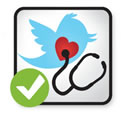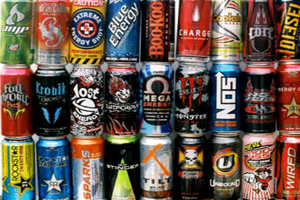May 31st, 2011 by bdappen in
No Comments »
 What is HealthyRT?
What is HealthyRT?
HealthyRT is a Twitter account managed by a volunteer staff of healthcare professionals. Founded by Dr. Val Jones, CEO of Better Health, LLC, the goal of HealthyRT is to provide Twitter subscribers with a peer-reviewed stream of science-based content, trustworthy health information, and links to excellent medical journalism. It is hoped that those who follow the feed will re-tweet (RT) the links and stories that they find most helpful. By re-tweeting the messages from HealthyRT, subscribers can easily lend their support to the promotion of sound science.
Why do we need HealthyRT?
In today’s rapidly evolving digital world, misinformation, exaggerated claims, and bad science is promoted (often unwittingly) via social media platforms every day. This can lead to misconceptions that drive poor health decisions. Individuals may seek out unnecessary tests, unsafe or unproven treatments and procedures, or even opt out of effective or life-saving treatments because of misinformation from the Internet. HealthyRT hopes to offer a trusted counter point to misguided or inaccurate health claims and information.
Who are the reviewers for HealthyRT?
Here is a list of reviewers who currently write the tweets from the HealthyRT account:
| Name/Degree(s) |
Specialty |
Location |
Social Media |
| Jay Rosenbloom, MD, PhD |
Pediatrics |
Affiliate Assistant Professor at Oregon Health Sciences University |
 |
 |
 |
| John Weiner, MD |
Allergy/Clinical Immunology |
Melbourne, Australia |
|
 |
 |
| Robert Miller, MD |
Oncology/Medical Informatics |
Sidney Kimmel Comprehensive Cancer Center at Johns Hopkins |
|
 |
 |
| Hisham Rana, MD |
|
Los Angeles, CA |
 |
 |
 |
| Catherine Anderson, PhD |
Medical Genetics |
Vancouver, British Columbia |
|
 |
 |
| Laura Nathan-Garner |
Communications |
MD Anderson Cancer Center, Houston, TX |
 |
 |
 |
| Paul Storey |
Health Data Harmonisation |
Canberra, Australia |
|
 |
 |
| Ryan Madanick, MD |
Gastroenterology |
UNC School of Medicine |
|
 |
 |
| Russ Johnson, MD |
Psychiatry |
Greeley, CO |
|
 |
 |
| Justin Bosley |
Medical Student |
U. Penn, Philadelphia, PA |
|
 |
|
| Nicholas Fogelson, MD |
Obstetrics & Gynecology |
|
|
 |
 |
| Elizabeth Lee, MD |
Surgery |
Berkeley, CA |
|
 |
 |
| Vijay Sadasivam, MBBS, DMRD, DipNB |
Diagnostic Radiology |
Salem, Tamil Nadu, India |
|
 |
 |
| Joseph Albietz, MD |
Pediatrics/Pediatric Critical Care |
University of Colorado, Denver |
|
 |
 |
| Damon Ramsey, MD |
Family Medicine |
St. Paul’s Hospital, Vancouver, Canada |
 |
 |
 |
| Houtan Chaboki, MD |
Facial Plastic Surgery |
Washington, DC |
 |
 |
 |
| Natasha Burgert, MD |
Pediatrics |
Pediatric Associates, Kansas City, MO |
|
 |
 |
| Ann Becker-Schutte, PsyD |
Counseling Psychology/Grief & Loss |
Kansas City, MO |
 |
 |
 |
| Melissa Travis |
Sociology |
Columbus, OH |
|
 |
 |
| Howard J. Luks, MD |
Orthopedic Surgery |
New York Medical College, Katonah, NY |
 |
 |
 |
| Eric Marcotte, MD |
Family Medicine |
Sheridan, Indiana |
|
 |
 |
| Scott Gavura, RPh |
Pharmacy |
Toronto, Ontario |
|
 |
 |
How do I become a reviewer for HealthyRT?
If you are a trained healthcare professional with a commitment to science-based medicine, please contact Dr. Val Jones to be considered for the HealthyRT review team.
Thank you for following HealthyRT on Twitter. I hope that you’ll find our content enlightening and that you’ll support our efforts by re-tweeting our content as much as possible.
With Best Regards,
Val Jones, M.D.
January 9th, 2011 by admin in Better Health Network, Health Tips
No Comments »

 By Scott Gavura, BScPhm, MBA, RPh for Science-Based Medicine
By Scott Gavura, BScPhm, MBA, RPh for Science-Based Medicine
My stimulant of choice is coffee. I started drinking it in first-year university, and never looked back. A tiny four-cup coffee maker became my reliable companion right through graduate school.
But since I stopped needing to drink a pot at a time, an entirely new category of products has appeared — the energy drink. Targeting students, athletes, and others seeking a mental or physical boost, energy drinks are now an enormous industry: From the first U.S. product sale in 1997, the market size was $4.8 billion by 2008, and continues to grow. (1)
My precious coffee effectively has a single therapeutic ingredient, caffeine. Its pharmacology is well documented, and the physiologic effects are understood. The safety data isn’t too shabby either: it’s probably not harmful and possibly is even beneficial. (I’m talking about oral consumption — no coffee enemas. Please.) In comparison, energy drinks are a bewildering category of products with an array of ingredients including caffeine, amino acids, vitamins, and other “natural” substances and assorted “nutraceuticals,” usually in a sugar-laden vehicle (though sugar-free versions exist). Given many products contain chemicals with pharmacologic effects, understanding the risks, signs of adverse events, and potential implications on drug therapy, are important.
So are energy drinks just candied caffeine delivery systems? Or are these syrupy supplements skirting drug regulations?
The Message
The ads are seductive. Who doesn’t want more energy? Who doesn’t want their mind and body “vitalized?” And don’t we have time-starved lifestyles? Initially envisioned for athletes, energy drinks are now marketed mainly towards teens and young adults, where uptake has been dramatic. Cross-promotion with extreme sporting events, and creating names like “Full Throttle,” “Rockstar,” and even “Cocaine” burnish the “extreme” image. The market is now segmented further with products targeted at women, vegetarians, diabetics, celiacs, and more. However you identify yourself, there’s probably an energy drink developed with you in mind. Read more »
*This blog post was originally published at Science-Based Medicine*
August 12th, 2010 by David Kroll, Ph.D. in Better Health Network, Health Policy, Health Tips, News, Opinion, Quackery Exposed, Research
2 Comments »

On the heels of Scott Gavura’s superb post on dietary supplement regulation in the U.S. and Canada, I bring you one of the most egregious and obscene product cases I have seen in 15 years of teaching on botanical and non-botanical products: Miracle Mineral Solution. Please accept my apologies in advance for not having a scholarly post for you — this is just too unbelievable not to share with science-based medicine readers. Read more »
*This blog post was originally published at Science-Based Medicine*
November 30th, 2009 by David Kroll, Ph.D. in Better Health Network, Health Policy, Quackery Exposed
2 Comments »

Two weeks ago, Canadian Skeptics United published on their Skeptic North site a piece by an Ontario pharmacist criticizing a proposal by the province to grant limited prescribing rights to naturopaths. The essay, which was reprinted in the National Post on Tuesday, outlines the intellectual and practical conundrum presented by allowing those with education that diverges from science-based practices to prescribe drugs.
The naturopath lobby came out in force and was relatively unopposed in the 54 comments that followed, primarily because the NP closes comments 24 hours after online posting. Therefore, those with a more rational and considered viewpoint based in facts were locked out from commenting. This is quite disappointing to me personally and professionally because of the wildly emotional appeals, strawman arguments, and smears and attacks on the author himself without, of course, addressing his well-founded criticism of the prescribing proposal before the provincial government.
At the Skeptic North post, the piece even drew a naturopath who equated the criticism of his/her field with the Nazis and Mussolini. However, you can’t write critiques of these practices without attracting attacks ad hominem, especially Godwin’s Law, that are the resort of those whose arguments are logically flawed. Read more »
*This blog post was originally published at Science-Based Medicine*
 What is HealthyRT?
What is HealthyRT?













